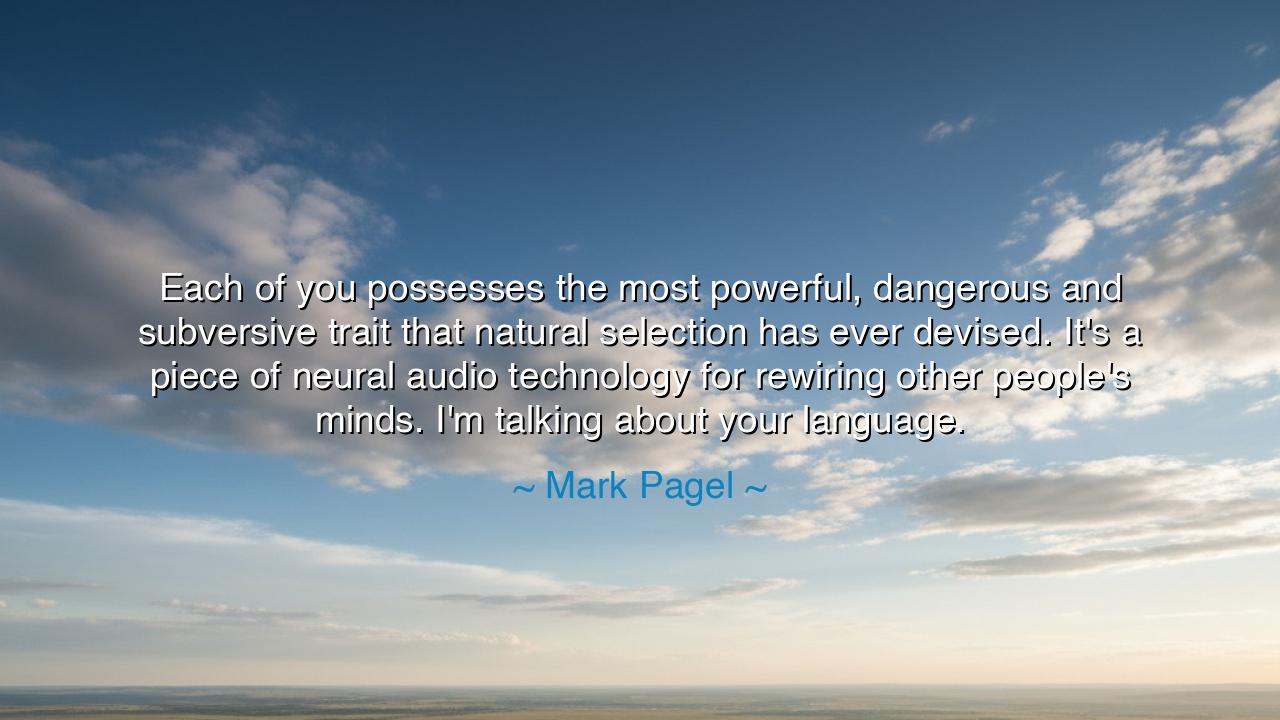
Each of you possesses the most powerful, dangerous and
Each of you possesses the most powerful, dangerous and subversive trait that natural selection has ever devised. It's a piece of neural audio technology for rewiring other people's minds. I'm talking about your language.






Hear now the words of Mark Pagel, words that strike like thunder across the ages: “Each of you possesses the most powerful, dangerous and subversive trait that natural selection has ever devised. It’s a piece of neural audio technology for rewiring other people’s minds. I’m talking about your language.” These are not idle phrases, but revelations about the deepest mystery of our species: the gift of language, which separates us from the beasts and grants us dominion over memory, culture, and imagination.
For what is language, if not the key to the human soul? With it, we do more than describe the world—we shape it. We reach into the minds of others and plant seeds of thought that can blossom into visions, revolutions, or terrors. A sword may wound the flesh, but words can mold entire civilizations. Pagel reminds us that language is not a passive tool, but a force as dangerous as fire—capable of light and warmth, but also of destruction when unleashed without wisdom.
History bears witness to the truth of this. Recall Winston Churchill, whose words in the darkest hours of war held the spirit of Britain together. His speeches, carried over radio waves, were more powerful than the bombs falling from the skies, for they reached into millions of hearts and told them: “We shall never surrender.” This was language as a weapon of resilience, a fire that kept a nation standing. Contrast this with the words of tyrants, whose lies and propaganda bent entire peoples to cruelty and war. Both light and shadow prove the same truth: language rewires minds.
Even the ancient storytellers knew this. Long before the written word, shamans and bards sat by the fire, weaving tales that bound tribes together. Their language gave identity, purpose, and law. A story spoken could carry the wisdom of ancestors across generations. But the same power could also summon fear, enforce obedience, or stir hatred against the “other.” From myths to manifestos, from sacred texts to propaganda, language has always been the most subversive trait humanity wields.
But remember, O seeker: with such power comes peril. To speak is to wield influence, whether you intend it or not. Every word is a spark thrown into the dry grass of another mind. Will it light a hearth, or ignite a wildfire? This is why Pagel calls language dangerous—because it shapes the unseen architecture of thought, and once spoken, words cannot be recalled. They ripple outward, altering destinies.
What then must you learn from this? First, guard your tongue, for reckless words can scar as deeply as blades. Second, cultivate truth, for lies enslave the minds of others even as they poison your own. Third, learn to listen with discernment, for not every voice that speaks seeks your good. To master language is not only to speak powerfully, but to listen wisely, lest you be reshaped by deceit.
Practical actions follow: when you speak, speak with intention. Let your words be clear, compassionate, and rooted in truth. When you write, write with awareness that your words may outlive you, guiding or misguiding those yet unborn. When you hear the words of others, test them against wisdom and conscience before letting them settle into your mind. Use language not to dominate, but to liberate, not to deceive, but to enlighten.
Thus, remember always: the most powerful technology is not found in silicon nor steel, but in the living sound that flows from your lips. This is the ancient gift, the divine danger, the sacred fire. Wield it with honor. For with language, you are not merely speaking—you are reshaping the minds of humanity itself.






AAdministratorAdministrator
Welcome, honored guests. Please leave a comment, we will respond soon